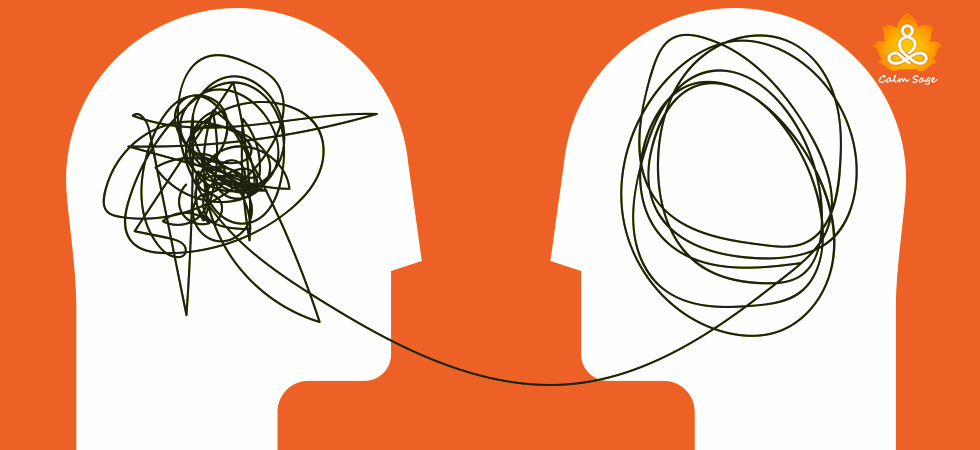All You Need To Know About Empathy Deficit Disorder

Talking about putting ourselves in someone else’s shoes might be easy but actually doing it might not be as easy for some people. Empathy is the ability that makes us feel emotionally connected to others. This lack of empathy, of a moral compass, can be termed Empathy Deficit Disorder (EDD).
In this article, I’ll be helping you understand what empathy deficit disorder is, its symptoms, and how lack of empathy can affect our mental and emotional health.
In our day-to-day lives, empathy plays an important role and makes us capable of reacting with compassion to a peer, family member, friend, or co-worker when we see them struggling with emotions or situations such as a death of a loved one, coping with divorce, losing a job, etc.
There are some people such as highly sensitive people who experience hyper empathy. They are sensitive and highly attuned to others’ emotions and feelings. On the other hand, some people experience a lack of empathy, where they fail to understand and connect with another person, emotionally. This empathy deficiency can cause a rift in relationships and social connections.
Empathy vs. Sympathy
Many people like using empathy and sympathy interchangeably, but these two are different emotional responses. While each of these emotional responses may involve compassion towards others, there is a difference in perspective. Empathy is when you put yourself in someone else’s shoes (metaphorically) to experience the emotions they are feeling, firsthand. Sympathy, on the other hand, is acknowledging the other person’s suffering but not necessarily sharing the emotions as they are.
Hen you’re empathetic, you’re more open, actively listening, and have a willingness to connect with others. In the face of EDD, empathy can be worn out by social isolation and other factors. Sympathy is when you offer a surface-level response to what others feel and experience. You express your concern but are not deeply attached to them.
One major difference between empathy and sympathy is in their communication style and support. When I talk about empathy, it’s an active process where you’re listening, understanding, and validating the other person’s experiences. When you empathize, you allow the other person to find a safe space with you where they know they’ll be understood and validated. Empathy in terms of emotions is supposed to promote feelings of trust and support.
Now, on the other hand, if you’re sympathetic then you may come off as detached and indifferent. Now, don’t get me wrong. While showing sympathy means you care and are concerned, it necessarily does not convey the same understanding that empathy does. It’s like a detached form of empathy where you are comforting others without engaging in their emotions. In the end, sympathy may come off as cold and distant, and instead of promoting support as empathy does, sympathy may give off a sense of separation.
What Is Empathy Deficit Disorder?

As human beings, we can feel, identify, and express emotions. However, when one fails to recognize or emotionally connect with another, they can be described using the term empathy deficit disorder or EDD.
This, not exactly a mental health disorder, can result in a person facing difficulty forming meaningful relationships, connecting socially, and even managing conflicts.
EDD can also be a symptom of some specific mental health disorders such as:
- Narcissistic Personality Disorder
- Antisocial Personality Disorder
- Bipolar Disorder
- Borderline Personality Disorder
- Autistic Spectrum Disorder
A person with empathy deficit disorder often believes that their wants, needs, and expectations are more important than those of their loved ones.
However, not all struggling with mental health disorders may struggle with the lack of empathy. For instance, your partner struggling to understand your emotional needs can be someone with empathy deficit disorder and may not know it. It could also be a friend who gets angry when things don’t go their way.
Being empathetic not only improves our emotional and social wellness but general health and wellness too.
What Might Be The Symptoms Of Empathy Deficit Disorder?
Empathy deficit disorder symptoms can be:
1. Others’ Emotions Makes You Squirm
Here, we are specifically talking about the emotional symptoms of empathy deficit disorder. In this case, a person with a lack of empathy only feels discomfort and discomfort when the feelings and emotions of others are involved.
For example, if you’re struggling with a lack of empathy and you see your partner upset or sad. Here, the thought in your mind would be that they need attention. You will not bother with asking them and understanding their problem.
People with empathy deficit disorder often struggle with making emotional connections and fulfilling the emotional needs of their loved ones.
2. You’re More Focused On Your Goals & Needs
Lack of empathy is common in people who are focused and driven towards personal development. It can also be common in people with self-help addiction. You need to be independent and assertive only encourages you to focus on your goals and needs.
In other words, others’ problems are not your problems. Only yours are. Being empathetic means being in tune with others and knowing that other people, their needs, and goals are as important as you and yours.
3. You Worry About Yourself More
An empathetic person is concerned about society and the betterment of their community as a whole. However, a person with empathy deficit disorder is only interested in events that benefit them and worry only about themselves in the long run.
People with a lack of empathy are also those who say that climate change doesn’t interest them because what happens in the future is not of concern to them as they won’t be alive by then.
4. You’re Quick To Criticize & Judge
An empathetic person knows the need to understand and connect with others’ needs and emotions before they make a judgment. Someone with an empathy deficit disorder is quick to criticize and judge others. They’re quick at disapproving of others’ views, feelings, and opinions.
These empathy deficit disorder symptoms can help you understand if you or your partner is struggling with this disorder. There is an empathy deficit disorder test that can be taken online or under the supervision of a mental health professional to determine your empathy quotient.
Managing Empathy Deficit Disorder
The emotions and behaviors concerning personality disorders can be difficult to diagnose. Empathy deficit disorder, while not a recognized disorder in the DSM-5 can still be managed with simple steps.
Empathy deficit disorder treatment is not much but with the help of these ways, you can learn to build empathy. Empathy deficit disorder in relationships can be managed by:
- Self-Reflection: Understanding ourselves and our emotions before we can begin to understand others is important. You can try these self-reflection prompts to get started.
- Building Connections: For someone who struggles with forming connections, this can be hard. But try to put yourself in the other person’s situation. Think about their hopes, goals, and dreams. Find things you have in common with them. Fostering a connection with them can help you build empathy.
- Counseling: With the help of a mental health professional, you can learn how empathy is important for our overall wellness. Counseling is an effective way to understand EDD, its symptoms, and how it is connected to your mental health.
Another way to treat empathy deficit disorder is to consult a therapist. Therapy or counseling also offers a safe, non-judgmental space for you to express your feelings, emotions, opinions, and thoughts. Moreover, a therapist can offer better ways to develop empathy and can teach you how to communicate better with others when you’re struggling with empathy deficit disorder.
How Do You Develop EDD?
Empathy Deficit Disorder is not a recognized mental health disorder. It is just a term that is used to describe the lack of empathy in a person’s emotional response. Empathy is one of the most fundamental emotions that we humans have and because it isn’t a disorder, it cannot be developed.
It’s, nonetheless, possible to experience a lack of empathy or struggle with being an empath because of various factors such as social experiences, childhood experiences, genetics, or other developmental factors.
Potential reasons or factors that can cause you to struggle with empathy (or the lack of it) can include;
- Personal trauma that results in you developing empath disorder as a coping mechanism
- Lack of emotional awareness
- A cultural or social upbringing where there has been limited exposure to empathic responses
- Developmental factors such as having autism spectrum disorder or such conditions where a person finds it difficult to understand others’ emotions accurately
Why Do Some People Lack Empathy?
The ability to understand others and share their feelings varies from person to person and can depend on a lot of factors including biological, psychological, and even social factors. Here are some reasons why some people may lack empathy;
- Genetics: Variations in gene structure and brain development can be one of the factors that may cause a person to lack empathy or develop EDD.
- Early childhood factors: Children who were exposed to uncaring interactions and a neglectful environment while growing up can also develop EDD.
- Personality disorders: Personality disorders such as narcissism and psychopathic traits can also affect empathy in a person and can make it harder for them to understand others’ emotions.
- Poor mental health: If a person has autism spectrum disorder then it can also make them more susceptible to empathy deficit disorder. Even past traumatic experiences can make it harder for one to connect with others’ emotions.
We need to understand that even empathy exists on a spectrum and various factors can play a role in its execution in our lives and thinking. While some people are naturally empathetic, others are born with a reduced capacity for empathy. No one is wrong for having low empathy, but empathy as a skill can help you connect with others on a deeper level. You can develop empathy skills by working on your self-awareness and compassion toward others.
Frequently Asked Questions
Q1 : What causes empathy deficit disorder?
Many psychiatric conditions can cause empathy deficit disorder or empathy deficiency. These conditions or traits can be psychopathy, antisocial personality, borderline personality, narcissism, autism, and alexithymia.
Q2 : How do I know if I have empathy deficit disorder?
You can refer to the symptoms listed in this article but if you suspect your partner or you struggling with empathy deficit disorder then you may have trouble making new friends, difficulty making emotional connections, you’re quick to criticize others, and may often struggle to show emotions towards others.
Q3 : What part of the brain causes a lack of empathy?
Multiple areas in the frontal lobe are responsible for empathy. For example, the right supramarginal gyrus helps us overcome self-centeredness and the orbitofrontal cortex of the brain helps us with reaction processing and can play a big role in helping us react to others’ emotions and feelings. When either of these areas of the brain is damaged for any reason, empathy deficit disorder can occur.
Q4 : Is empathy deficit disorder serious?
Empathy and compassion are important skills that can help us build connections, make good decisions, and live meaningful lives. Any lack of empathy can have serious consequences. For example, empathy deficit disorder prevents you from tuning in to other people’s experiences, especially those who think and feel differently than you. This can cause personal conflicts, miscommunication in relationships, and hatred towards others.
Q5 : What are the long-term consequences of empathy deficit disorder?
Some of the long-term consequences of empathy deficit disorder include problems in intimate and close relationships, poor communication, and a lack of altruistic behaviors. Empathy deficit disorder in the healthcare industry can have severe consequences as healthcare workers with EDD can result in uncompassionate care and poor patient health.
For more on empathy deficit disorder, or to connect with a counselor, you can write to us at info@calmsage.com or DM us on social media. You can also comment below to let us know your thoughts!
Take Care!




















